unit 12 You’re supposed to shank hands
文档属性
| 名称 | unit 12 You’re supposed to shank hands | 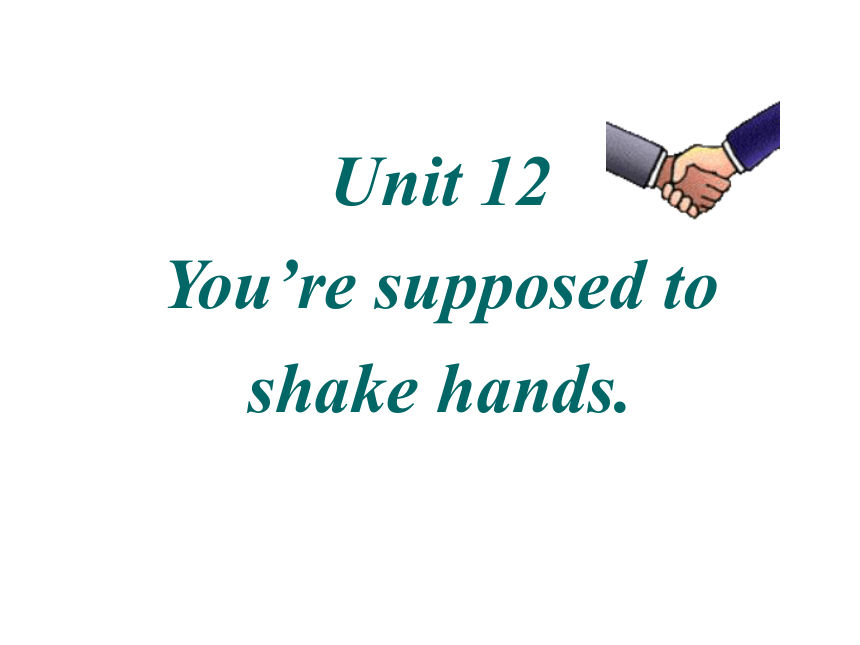 | |
| 格式 | rar | ||
| 文件大小 | 6.6MB | ||
| 资源类型 | 教案 | ||
| 版本资源 | 人教新目标(Go for it)版 | ||
| 科目 | 英语 | ||
| 更新时间 | 2008-09-21 12:05:00 | ||
图片预览


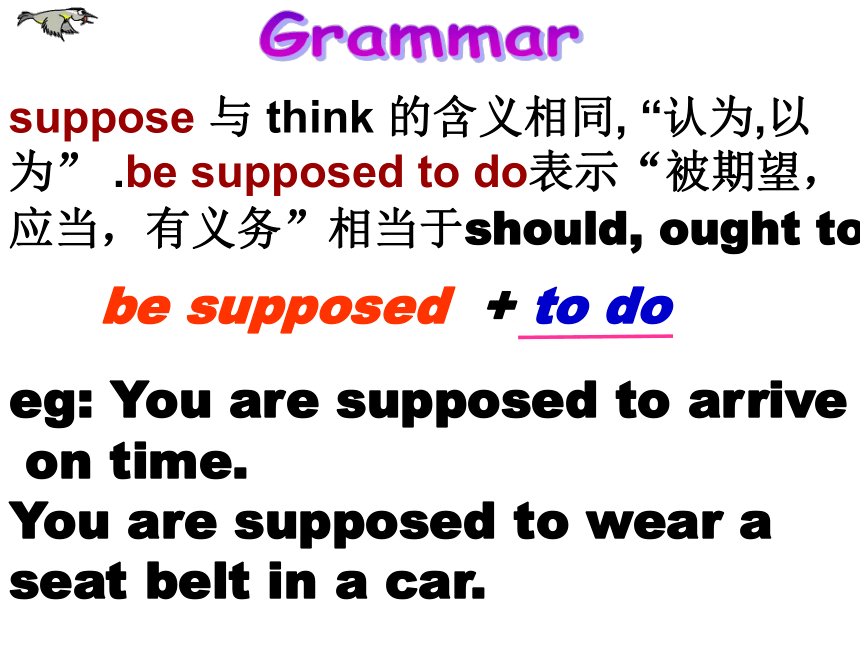

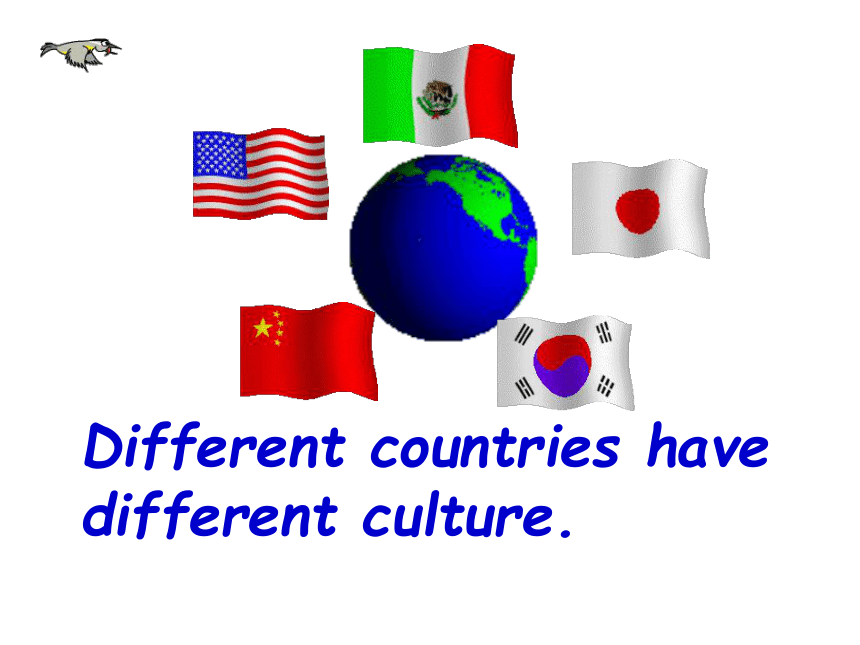
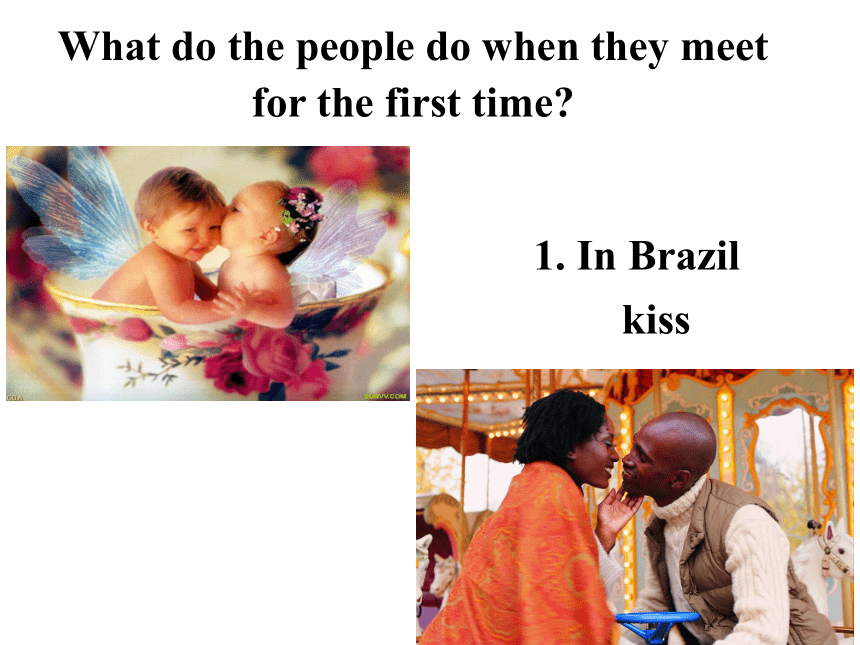

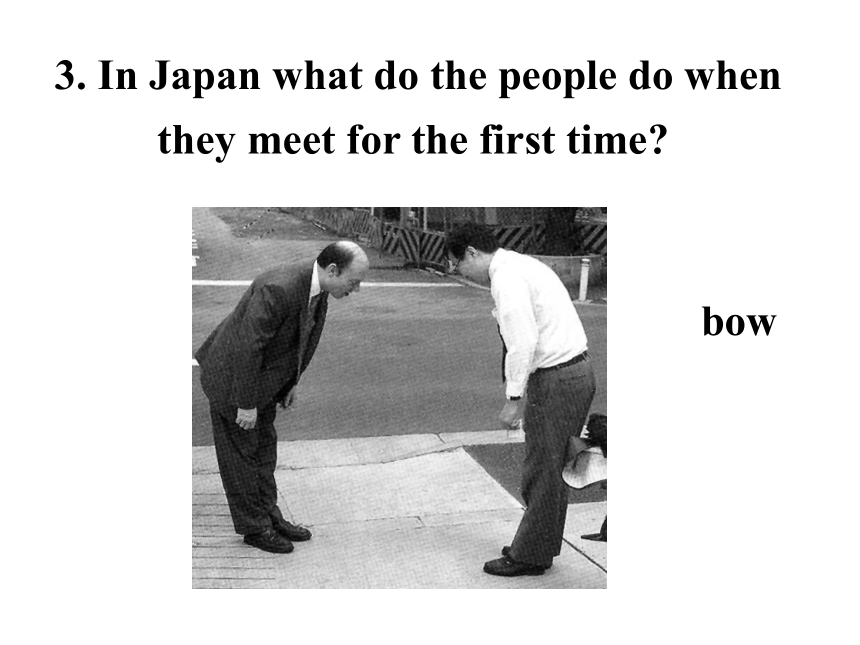
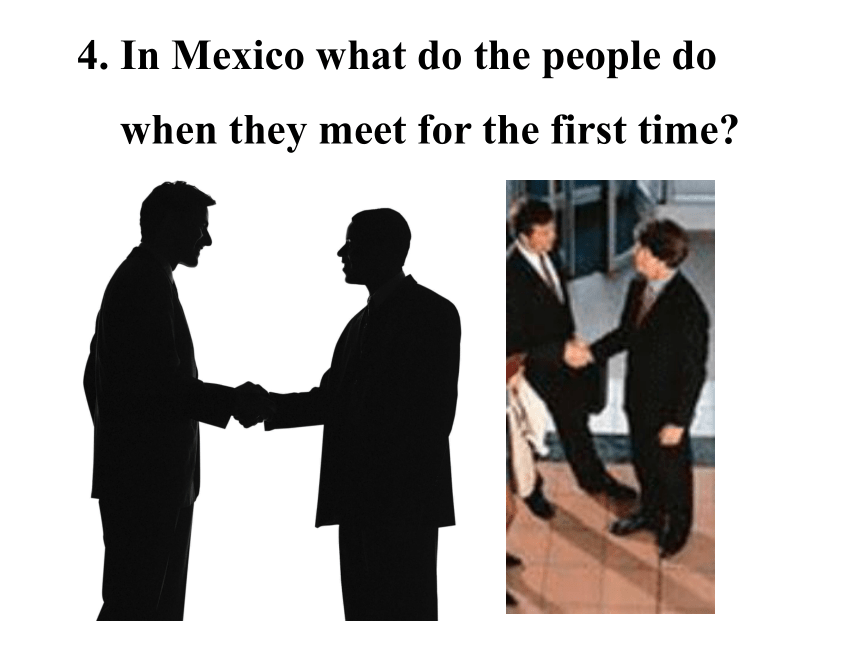
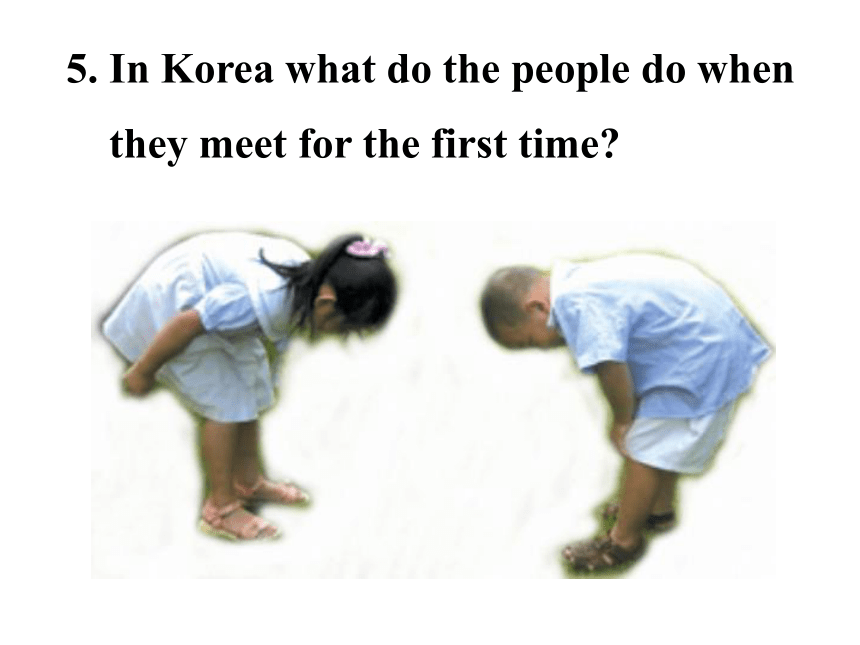
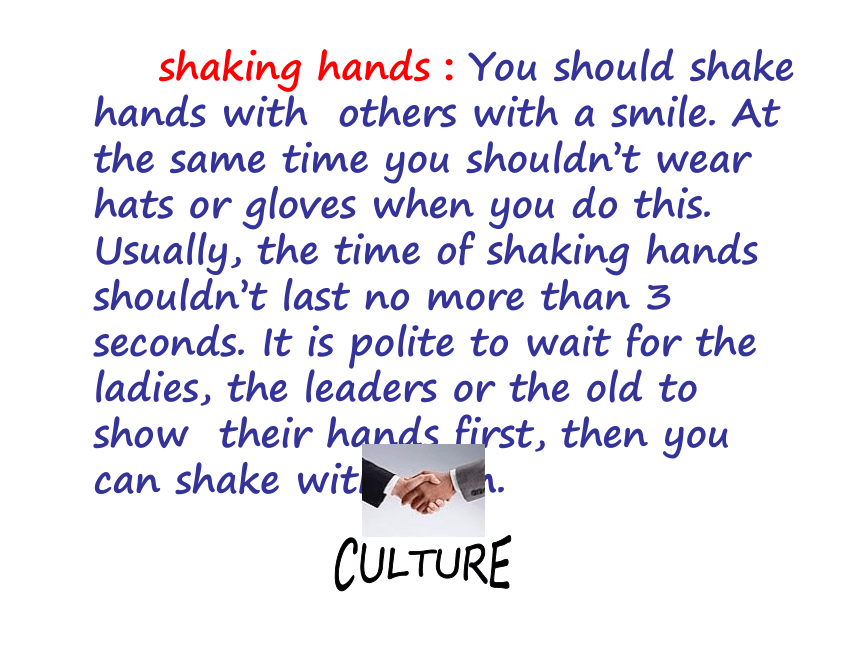
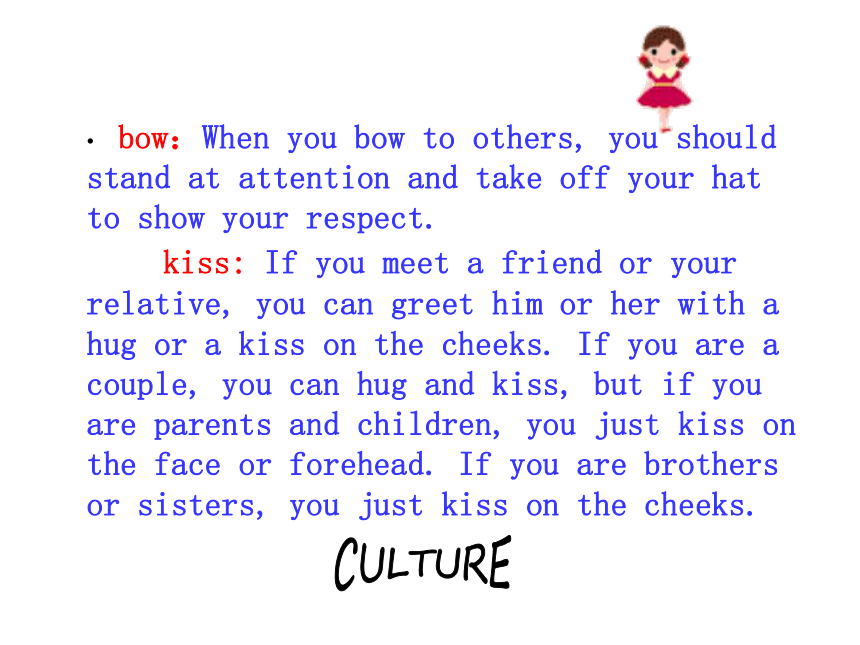
文档简介
课件107张PPT。Unit 12
You’re supposed to shake hands.Language Goal:Tell what you are
supposed to do.Grammarsuppose 与 think 的含义相同, “认为,以
为” .be supposed to do表示“被期望,应当,有义务”相当于should, ought to。be supposed + to doeg: You are supposed to arrive
on time.
You are supposed to wear a
seat belt in a car.BrazilKoreaJapanthe United StatesMexicoDifferent countries have
different culture.What do the people do when they meet for the first time? 1. In Brazilkiss2. In the United States what do the
people do when they meet for the
first time?shake hands 3. In Japan what do the people do when they meet for the first time?bow 4. In Mexico what do the people do
when they meet for the first time? 5. In Korea what do the people do when
they meet for the first time? ?? shaking hands:You should shake hands with others with a smile. At the same time you shouldn’t wear hats or gloves when you do this. Usually, the time of shaking hands shouldn’t last no more than 3 seconds. It is polite to wait for the ladies, the leaders or the old to show their hands first, then you can shake with them.CULTURE bow:When you bow to others, you should stand at attention and take off your hat to show your respect.
kiss: If you meet a friend or your relative, you can greet him or her with a hug or a kiss on the cheeks. If you are a couple, you can hug and kiss, but if you are parents and children, you just kiss on the face or forehead. If you are brothers or sisters, you just kiss on the cheeks.CULTURE1b ListeningcbabaWe put hands together in front of the chest.What are people in India supposed to do when they meet for the first time?1c2aMaria’s mistakeListening2a Listen Maria is an exchange student. Last night she had dinner at an American friend’s house. Listen and check the mistakes Maria made.Maria’s mistakes
_____arrive late
_____ate the wrong food
_____greeted Paul’s mother the wrong way
_____wore the wrong clothes√√√Maria: I was supposed to____________,
but I arrived at 8:00.
Maria: In my country, it’s different.
When you’re invited for 7:00,
you’re supposed to__________ .
Dan: And you were supposed to
____________ instead.
Dan: I guess you should have asked
what you were supposed to_____. arrive at 7:00come latershake handswear2b How was the dinner at Paul’s house last night?Well, it was OK, but I made some mistakes. I was supposed to arrive at 7:00,but I arrived at 8:00.pairwork2c Where I’m from, we’re pretty relaxed about time. If you tell a friend you’re going to their house for dinner, it’s okay if you arrive a bit late. Spending time with family and friends is very important to us. We often just drop by our friends’ homes. We don’t usually have to make plans to meet our friends. Often we just walk around the town center, seeing as many of our friends as we can!Read the following opinions of a Colombian and a Swiss student and fill in the chart. In Switzerland, it’s very important to be on time. We’re the land of watches, after all! If someone invites you to meet them at 4:00, you have to be there at 4:00. If you’re even fifteen minutes late, your friend may get angry. Also, we never visit a friend’s house without calling first. We usually make plans to see friends. We usually plan to do something interesting, or go somewhere together.Read the following opinions of a Colombia and
a Swiss student and fill in the chart.being on timeColombiaSwitzerlandPretty relaxed about time.Very important to be on time.visiting a friend’s houseUsually plan to do something
interesting or go somewhere
together.Often just drop by friends’ house.Never visit a friend’s house
without calling first.making plans with friendsDon’t usually have to make plans
to meet friends.What kind of rules do you have in Colombia?Well, they have pretty relaxed rules. 3bLike what?Well, it’s OK if you’re not on time.Role play the conversation between Teresa
and Marc.What kinds of rules do they have in
Colombia?
Well, they have pretty relaxed rules.
Like what?
Well, it’s OK if you’re not on time.A:B:3b PAIRWORKA:B:4 PAIRWORKIn China, what is supposed to do in these following situations?1. greeting teachers say, “Good morning.”2. doing homework 3. phoning someone 4. visiting someone’s
place call first, and knock
at the doordo homework at home
or in school after classsay, “Hello, this is….”5. making plans with
friends PAIRWORKIn China, what is supposed to do in these following situations?6. being on time 7. giving gifts discuss the plan, call
to make changes.always be on time or
a little earlier.give gifts on Festivals
or special daysSection B Unit12
You're supposed to shake hands! How much do you know about table manners around
the world? In the United States, you are not supposed
to eat with your hands. In Japan, you are not supposed
to eat or drink while walking down the street, and you
are supposed to make noise while eating noodles. It
shows that you like the food. In Korea, even the
youngest person isn’t supposed to start eating first. But
in China, you are supposed to pick up your bowl of rice.
Don't stick your chopsticks upright in the rice bowl.
Instead, lay them on your dish. And sometimes the
Chinese host use their chopsticks to put food in your
bowl or plate. This is a sign of politeness. About Table MannersIn the United States, you’re not supposed to eat with your hands.∨In PeruYou’re not supposed to
talk at the table.×In China, you’re not supposed to pick up your bowl to eat.×In Korea, the youngest person
is supposed to start
eating first.×In Brazil, you should wipe your mouth with your napkin every time you take a drink.∨2a Listening243—1.You aren’t supposed to
__2.It’s polite…
__3.It’s rude…
__4. You shouldn’t…2b ListeningabcdIn general, having a great time.
Even better than I thought it would be.host family is really niceFrench has improvedtable manners where to put the breadeat with handsfullput your hands in your lapget used to Dear Laura,
Thanks for your message. Yes, I’m having a great
time on my exchange program in France. It’s even
better than I thought it would be. I was a bit nervous
before I arrived here, but there was no reason to be.
My host family is really nice. They go out of their way
to make me feel at home. And you wouldn’t believe
how quickly my French has improved! I’m very
comfortable speaking French now. Although I still make
lots of mistakes, it doesn’t bother me like it used to. My
biggest challenge is learning how to behave at the
dinner table. As you can imagine, things are really
different from the way they are at home. 3aFor example, you’re not supposed to put your
bread on your plate. You’re supposed to put it on
the table! I thought that was pretty strange at first,
but now I’m used to it. You’re not supposed to eat
anything with your hands except bread, not even
fruit! (You have to cut it up and eat it with a fork.)
Another thing is that it is very rude to say you’re
full. If you don’t want any more food, you should
just say, “It was delicious.”Also, it’s rude to put your hands in your lap. You
should always keep your hands, but not your
elbows, on the table. I have to say, I find it difficult
to remember everything, but I’m gradually getting
used to things and don’t find them so strange any
more. I’ll write soon and tell you more about life in
France. Hope you’re having a good school year.
Wang Kun1.Why was Wang Kin nervous before she arrived in France?Her French was not very good.3a Reading2. Why did she have no reason to be nervous?Her host family was really nice.3. How was her French improved?She is very comfortable speaking English now.5. What does she find surprising?You put your bread on the tables not on the plate.4. What is one particular challenge she is
facing?One particular challenge is learning how to behave at the dinner table.arrive meet spend behave imagineSelfcheckPeople in Japan and America _________
differently at the dinner table.
2.You can ____________ how different the table
manners here are from ours.
3.In Singapore, the trains always ____________
on time. They are never late.
4.On Chinese New Year, people like to ________
time with their families.
5.I usually ___________ my friends in the library
on Friday nights.behaveimaginearrivespendmeet2 When I first ate in a western restaurant, I didn’t know what I was supposed to do. Everything was unfamiliar. I was used to eating with chopsticks and a spoon, but I had to eat with a knife, a fork and a spoon. And I had not just one set to use, but two or three of each. Questions crowded my mind. Was I supposed to begin with the largest ones or the smallest? Was I supposed to start at the outside and work in or the inside and work out? Was I supposed to hold the spoon in my left hand or my right hand? What I finally decided to do was…CULTURE1.When you are invited to dinner by Americans, the hostess expects you to be there on time or not more than a few minutes later.
2.When the guests sit down at a dinner table, it is common for the men to help ladies by pushing their chairs under them. Some families have a habit of offering a prayer of thanks before they eat.
3.Europeans keep the knife on the right hand, the fork on the left. But Americans use just one hand, and keep the other one on the lap. They constantly change their fork to the left hand when they have to cut meat.4. You should leave a spoon to lie flat. (a coffee spoon on the saucer, a soup spoon on the service plate beside the soup bowl.)
5.When Americans eat the bread, they hold it in their fingers, usually break it first.
6.If you have to leave during the meal, you should ask the hostess, “Would you please excuse me for a minute?” After the meal, you needn’t fold the napkins unless you are house guests and want to stay for more than one meal.
7.When you leave, it is a custom for you to say: “Goodbye. It was so nice of you to have me.” or “Thank you. I’ve had a nice time.” Then, maybe you can send a thank-you note.CULTURETable MannersYou are supposed to pick up your bowl of rice.Table MannersYou’re not supposed to eat with your hands.Table MannersYou’re not supposed to talk at the table.Table MannersThe youngest person is not supposed to start
eating first.In Japanmake noise while eating noodlesIn Japaneat or drink while walking down the streetIn Japanstick your chopsticks into your foodIn Japanpoint at anyone with your chopsticksYou're supposed to write quickly!Section1Section4Section2Section3Section2Co- operative learning合作学习两个人的能力要比一个人强,思考问题的
速度要快一些,学习的效果也会好些.因此,
和你的朋友合作学习,分享你的观点.Can you read these following expressions?F2FHow R U ?C U !BTWCUL8rface to faceHow are you?See you!By the way.See you later!Section1Before You Read1a~1bBRB
CU2morrow
ASAPI’ll be right back.
See you tomorrow!
as soon as possiblePlease write more expressions like the ones above!CSLgr8can’t stop laughinggreat : )Please take out your pen, and
blacken the e-mail English.Section1Are you ready?
Let’s go!
Before You Read Can you write in English? And can you also
write e-mail English? Maybe not. e-mail
English is a new kind of written English
that is being used to save time.
A lot of e-mail English words might look
unfamiliar to us-many look like rubbish!
While You Read
You’re supposed to write quickly!This is because they come from a computer
program called ICQ, which means I seek you.
ICQ is an e-mail “chatline” that people use to
have online conversations with friends. One
Canadian teacher says, “People can use their
computers to talk to each other.But you are supposed
to type quickly so the other person doesn’t get bored,
Using e-mail English helps you write quickly.”
While You Read E-mail English mostly uses two types of word. The
first is “abbreviations”. This is formed by using the first letter of each word in the phrase. For example , BTW means “by the way”, and GSL means “can’t stop laughing”. The second kind of word is a “homophone”- it’s created by combining letters and symbols, or numbers, to sound like other words. An example of this would be to write “great” as “gr8”, or to write “see you later” as“CUL8r”.While You Read When you write e-mail English you do not use
punctuation marks only in the traditional way. You are
also supposed to use them to show the emotion you are
feeling. These are called “emotions”. The advantage
of using punctuation marks is that you can
make faces with them. The most common one is the
happy face- it looks like this :) And it is made with
a colon and a right bracket beside it.While You Read E-mail English is fun- it’s almost like writing
riddles. You Can learn it easily by yourselves, and
experiment with your own ideas. It is not rude to
write e-mail English, but it is important to use it only
at the proper time- when you are e-mailing a friend,
or sending a message to a friend on mobile phone.
But you shouldn’t use it in class, and remember your
teachers will not be pleased if you write e-mail
English in a test!While You ReadSection3After You Read3 types of e-mail English at the top of
each column. Give a example.abbreviations
2.homophones
3.emoticonsBTW, CSLgr8, CUL8r:)Section3After You ReadE-mail English is used
to have fun b) to save time c) to study faster
WBQ would mean
with best wishes b) which queue c) write back quickly
“Great” sounds most like
late b) get c) seat
In e-mail English, punctuation marks are used
normally b) instead of c) to show feelings
E-mail English is supposed to be used
a) on mobile phones b) in class c) in testsSection4Go For It !I had a gr8 weekend & U?O-no! I’m going 2BL8 :-(I’ve Cn that movie 4xs, it’s
gr8, :)Xqz me, cd U pls help me?Section4Go For It !Write a note to some friends
using e-mail English, or practice
typing e-mail English messages on
a computer.Hi Min:
How R U ?
I had a very gr8 night yesterday.
I got many presents because
yesterday was my birthday. I’m
very happy! :)
I miss you very much , I really
want to talk with you F2F.
Have a nice day!
CU!
Unit 12Words and expressionsshake v. 摇动;摇;震动
to move quickly up and down and backwards and forwards
shake – shook – shaken – shaking
shake hands with sb. 与某人握手
They shook hands with each other.
shake one’s head 摇头
She shook her head and refused his help.
nod one’s head 点头
In some Asian countries nodding the head means not “Yes” but “No”.
2. custom n.
an activity that is part of the way of life of a particular group of people 风俗;习俗
It is the custom in France to shake hands a lot.
In France, it is the custom to shake hands with people in the office every morning.
3. bow v. ( bowed, bowed )
to bend forward the upper part of the body, or the head, to show respect
He bowed to his teacher.
The woman bowed to show her thanks.4. kiss v. & n.
to touch with the lips as a sign of love or as a greeting
She kissed her baby on the cheek.
kiss n.
She gave him a kiss.
The mother gave her little son a kiss.
5. relaxed adj.
relaxed rules 宽松的规则
relaxed atmosphere 轻松的气氛
6.drop by
“顺便来访,非正式访问”,指从某处经过时顺便访问。
He just dropped by.
I dropped by my friend’s home yesterday.
7. Switzerland n. 瑞士
Swiss n.& adj. 瑞士人(的)
8. land n. country
native land 祖国
land of watches
9. after all 毕竟 in spite of everything
So you see I was right after all.
你看看,我毕竟是对的。
He is a child after all.
above all 首先
at all 根本,丝毫
in all 总共,总计
10. towards = toward
prep. 对于;关于
attitude towards sb.
feelings towards sb./sth.
prep. 朝;向
He walked towards the school.
11. wipe v. to pass a cloth or other material against something to remove dirt, liquid, etc. 擦;拭;抹
wipe sth on… 在……上擦
Please wipe your feet on the mat(垫).
wipe sth with … 用……擦
She was sniffing and wiping her eyes with a tissue(手巾纸).
12. napkin n.
a piece of cloth or paper used for protecting one’s clothes and for cleaning one’s hands and lips during a meal
In the West before dinner they usually have a small bread roll and always put the napkin on your lap first.
The napkin should not be put into the collar or vest.
13. make noise / make a noise/ make noises
make much noise/make a lot of noises
sound / voice / noise
sound n.[C]表示能听见的任何声音
the sound of voices / of music / of breaking plates
说话声 / 音乐声 / 打碎盘子的声音
voice n.[C]是指人讲话或唱歌的声音
to have a loud voice 洪亮的嗓音
noise n. [C/U]通常是指声音大而不悦耳的噪音
Stop making so much noise.
noisy adj. ( noisier, noisiest )
noisily adv.
making a lot of noise
a noisy car
It’s very noisy in this classroom.14. stick v. ( stuck, stuck )
to push a pointed object into or through something
The nurse stuck the needle into my arm.
n. 棍子 walking stick 拐杖
15. rude adj. rude – polite impolite
( of a person or behaviour ) not at all polite
It’s rude to tell someone you don’t like them.
Don’t be so rude to your father.
16. point v.
to hold your finger out towards someone or something
Don’t point at me with your finger.
It’s impolite to point at others with your chopsticks.
point at 指近处
point to 指向远处
n. 点 2.6 two point six
go out of one’s way to do sth. 特地;格外努力;不怕麻烦;特意而为;绕道 (make a special effort to do sth.)
He went out of his way to see me off.
他特意来送我。
He would always go out of his way to be friendly to her.
他总是特意向她表示友好。
17. manner n.
the way of doing something
礼貌;风格;习惯;举止;态度
I don’t like his manner, it’s very rude.
令人愉快的态度
a pleasant manner
His manner is polite but cool.
他举止彬彬有礼而又冷漠。
manners n. 社交举止,社交习惯
Children should be taught good manners.
table manners 餐桌礼仪
have good/bad manners
It’s bad manners to talk with your mouth full of food.
He has no manners
18. be / get used to sth. / doing sth.
= get accustomed to sth. / doing sth.
used – unused
I get used to English food.
I’m not used to getting up so early.
19. fork n.
an instrument for eating food which has a handle at one end with two or more points at the other end20. full adj.
to have had enough to eat
I can’t eat anymore; I’m full.
hungry (反义词)
21. lap n.
the part of your body between your waist and your knees when your are sitting down
She was sitting on/in her mother’s lap.
Come and sit on/in my lap.22. elbow n.
the joint in the middle of your arm where it bends
23. gradually adv.
slowly,over a period of time 逐渐地;渐渐地
Gradually, the children began to understand.
Her health is gradually improving.
gradual adj.
There has been a gradual increase in the number of people owning cars.
24. particular adj.
special; unusual; worthy of notice; ( only before a noun ) (无比较级) 特别的;独特的
I have nothing particular to do today.
in particular 特别,尤其
I noticed his eyes in particular, because they were very large.
particularly adv.
He isn’t particularly clever.25. compliment n.[C] 称赞;恭维
an expression of praise, admiration, or respect
--You look lovely.
--Oh, thanks for your compliment.
He received many compliments on his new suit.
She’s always ready to pay a compliment.
称赞某人( pay sb. a compliment=pay a - to)
compliment v.赞美;恭维;祝贺
John complimented Jean on her new job.26. toast v. 敬酒
to drink and wish for the success and happiness of someone
He was toasted by all his friends.
Let’s toast our friend!
toast n.[C] 吐司,烤片面包;敬酒
a slice of buttered toast
一片涂奶油的烤面包
make a toast at dinner
27. unfamiliar adj. (familiar – unfamiliar)
not generally known, seen, or experienced
不熟悉的;没有经验的
Everything was unfamiliar.
sth. be (un)familiar to sb.
某物为某人所(不)熟悉
The place is familiar to me.
Your face seems familiar to me.
sb. be (un)familiar with sb./sth
某人(不)熟悉某人、某物
I’m not familiar with this computer.
I’m familiar with the place.
I seem familiar with the name.
=The name seems familiar to me.
Quiz:
Someone was speaking there; the voice was familiar _____ us.
A. by B. to C. for D. withB a large crowd of people
一大群人
There was/were a crowd of people in the park.
crowded adj.
completely full; filled with a crowd
a crowded room / street / store
Market was crowded with people.
28. spoon
29. knife n . ( pl. knives )
a knife and fork
eat with a knife and fork 30. crowd v. 挤满;充满;群聚
to fill a place so that it is not easy to move
Shoppers crowded the streets.
Questions crowded my head.
People crowded the bus.
crowd n. 人群;群众
a large number of people gathered together
a crowd waiting for the bus31. mostly adv. 多半;主要地;通常
I mostly work as a musician.
More immigrants(移民) arrived, mostly Europeans.32. form v. 构成;组成
This phrase is formed by two words.
33. mark n.记号;符号
His letter was full of exclamation(感叹) marks.
What do the strange marks on the top mean?34. learn …by oneself 自学
=teach oneself …
The boy learnt computer by himself.
我自学开车。
I learnt to drive by myself.
35. experiment v. 试验;实验
You can experiment with your own ideas and see if they work well.
Don’t try to experiment with drugs any time!
n. make/do an experiment with/on sth.36. proper adj. 合适的;适宜的;恰当的
She needs proper medical treatment.
That’s not the proper way to do it!
You can only use e-mail English at the proper time.37. pleased adj. 高兴的;满意的
pleasant adj. 令人愉快的;舒适的
pleasure n. 愉快;乐趣
I’m very ___________ you can show up.
This is such a __________ trip that everyone will enjoy it.
---Thanks a lot.
---It’s a ___________.pleasedpleasantpleasure38. queue n. (排队等候的一队人)
Don’t jump the queue. Please wait in line.
He is a queue jumper.
You must wait in a queue.
=You must wait in line.39. normally adv. 正常;通常地=usually
The patient started breathing normally again.
The flu normally lasts for a week or ten days.
Normally it takes about six days to arrange a visit.
normal adj. 40. whose / who / whom
_________ book is this?
_________ is this handbag?
_________ are you waiting for?
This is the girl after ________ she is looking.WhoseWhoseWho/Whomwhom
You’re supposed to shake hands.Language Goal:Tell what you are
supposed to do.Grammarsuppose 与 think 的含义相同, “认为,以
为” .be supposed to do表示“被期望,应当,有义务”相当于should, ought to。be supposed + to doeg: You are supposed to arrive
on time.
You are supposed to wear a
seat belt in a car.BrazilKoreaJapanthe United StatesMexicoDifferent countries have
different culture.What do the people do when they meet for the first time? 1. In Brazilkiss2. In the United States what do the
people do when they meet for the
first time?shake hands 3. In Japan what do the people do when they meet for the first time?bow 4. In Mexico what do the people do
when they meet for the first time? 5. In Korea what do the people do when
they meet for the first time? ?? shaking hands:You should shake hands with others with a smile. At the same time you shouldn’t wear hats or gloves when you do this. Usually, the time of shaking hands shouldn’t last no more than 3 seconds. It is polite to wait for the ladies, the leaders or the old to show their hands first, then you can shake with them.CULTURE bow:When you bow to others, you should stand at attention and take off your hat to show your respect.
kiss: If you meet a friend or your relative, you can greet him or her with a hug or a kiss on the cheeks. If you are a couple, you can hug and kiss, but if you are parents and children, you just kiss on the face or forehead. If you are brothers or sisters, you just kiss on the cheeks.CULTURE1b ListeningcbabaWe put hands together in front of the chest.What are people in India supposed to do when they meet for the first time?1c2aMaria’s mistakeListening2a Listen Maria is an exchange student. Last night she had dinner at an American friend’s house. Listen and check the mistakes Maria made.Maria’s mistakes
_____arrive late
_____ate the wrong food
_____greeted Paul’s mother the wrong way
_____wore the wrong clothes√√√Maria: I was supposed to____________,
but I arrived at 8:00.
Maria: In my country, it’s different.
When you’re invited for 7:00,
you’re supposed to__________ .
Dan: And you were supposed to
____________ instead.
Dan: I guess you should have asked
what you were supposed to_____. arrive at 7:00come latershake handswear2b How was the dinner at Paul’s house last night?Well, it was OK, but I made some mistakes. I was supposed to arrive at 7:00,but I arrived at 8:00.pairwork2c Where I’m from, we’re pretty relaxed about time. If you tell a friend you’re going to their house for dinner, it’s okay if you arrive a bit late. Spending time with family and friends is very important to us. We often just drop by our friends’ homes. We don’t usually have to make plans to meet our friends. Often we just walk around the town center, seeing as many of our friends as we can!Read the following opinions of a Colombian and a Swiss student and fill in the chart. In Switzerland, it’s very important to be on time. We’re the land of watches, after all! If someone invites you to meet them at 4:00, you have to be there at 4:00. If you’re even fifteen minutes late, your friend may get angry. Also, we never visit a friend’s house without calling first. We usually make plans to see friends. We usually plan to do something interesting, or go somewhere together.Read the following opinions of a Colombia and
a Swiss student and fill in the chart.being on timeColombiaSwitzerlandPretty relaxed about time.Very important to be on time.visiting a friend’s houseUsually plan to do something
interesting or go somewhere
together.Often just drop by friends’ house.Never visit a friend’s house
without calling first.making plans with friendsDon’t usually have to make plans
to meet friends.What kind of rules do you have in Colombia?Well, they have pretty relaxed rules. 3bLike what?Well, it’s OK if you’re not on time.Role play the conversation between Teresa
and Marc.What kinds of rules do they have in
Colombia?
Well, they have pretty relaxed rules.
Like what?
Well, it’s OK if you’re not on time.A:B:3b PAIRWORKA:B:4 PAIRWORKIn China, what is supposed to do in these following situations?1. greeting teachers say, “Good morning.”2. doing homework 3. phoning someone 4. visiting someone’s
place call first, and knock
at the doordo homework at home
or in school after classsay, “Hello, this is….”5. making plans with
friends PAIRWORKIn China, what is supposed to do in these following situations?6. being on time 7. giving gifts discuss the plan, call
to make changes.always be on time or
a little earlier.give gifts on Festivals
or special daysSection B Unit12
You're supposed to shake hands! How much do you know about table manners around
the world? In the United States, you are not supposed
to eat with your hands. In Japan, you are not supposed
to eat or drink while walking down the street, and you
are supposed to make noise while eating noodles. It
shows that you like the food. In Korea, even the
youngest person isn’t supposed to start eating first. But
in China, you are supposed to pick up your bowl of rice.
Don't stick your chopsticks upright in the rice bowl.
Instead, lay them on your dish. And sometimes the
Chinese host use their chopsticks to put food in your
bowl or plate. This is a sign of politeness. About Table MannersIn the United States, you’re not supposed to eat with your hands.∨In PeruYou’re not supposed to
talk at the table.×In China, you’re not supposed to pick up your bowl to eat.×In Korea, the youngest person
is supposed to start
eating first.×In Brazil, you should wipe your mouth with your napkin every time you take a drink.∨2a Listening243—1.You aren’t supposed to
__2.It’s polite…
__3.It’s rude…
__4. You shouldn’t…2b ListeningabcdIn general, having a great time.
Even better than I thought it would be.host family is really niceFrench has improvedtable manners where to put the breadeat with handsfullput your hands in your lapget used to Dear Laura,
Thanks for your message. Yes, I’m having a great
time on my exchange program in France. It’s even
better than I thought it would be. I was a bit nervous
before I arrived here, but there was no reason to be.
My host family is really nice. They go out of their way
to make me feel at home. And you wouldn’t believe
how quickly my French has improved! I’m very
comfortable speaking French now. Although I still make
lots of mistakes, it doesn’t bother me like it used to. My
biggest challenge is learning how to behave at the
dinner table. As you can imagine, things are really
different from the way they are at home. 3aFor example, you’re not supposed to put your
bread on your plate. You’re supposed to put it on
the table! I thought that was pretty strange at first,
but now I’m used to it. You’re not supposed to eat
anything with your hands except bread, not even
fruit! (You have to cut it up and eat it with a fork.)
Another thing is that it is very rude to say you’re
full. If you don’t want any more food, you should
just say, “It was delicious.”Also, it’s rude to put your hands in your lap. You
should always keep your hands, but not your
elbows, on the table. I have to say, I find it difficult
to remember everything, but I’m gradually getting
used to things and don’t find them so strange any
more. I’ll write soon and tell you more about life in
France. Hope you’re having a good school year.
Wang Kun1.Why was Wang Kin nervous before she arrived in France?Her French was not very good.3a Reading2. Why did she have no reason to be nervous?Her host family was really nice.3. How was her French improved?She is very comfortable speaking English now.5. What does she find surprising?You put your bread on the tables not on the plate.4. What is one particular challenge she is
facing?One particular challenge is learning how to behave at the dinner table.arrive meet spend behave imagineSelfcheckPeople in Japan and America _________
differently at the dinner table.
2.You can ____________ how different the table
manners here are from ours.
3.In Singapore, the trains always ____________
on time. They are never late.
4.On Chinese New Year, people like to ________
time with their families.
5.I usually ___________ my friends in the library
on Friday nights.behaveimaginearrivespendmeet2 When I first ate in a western restaurant, I didn’t know what I was supposed to do. Everything was unfamiliar. I was used to eating with chopsticks and a spoon, but I had to eat with a knife, a fork and a spoon. And I had not just one set to use, but two or three of each. Questions crowded my mind. Was I supposed to begin with the largest ones or the smallest? Was I supposed to start at the outside and work in or the inside and work out? Was I supposed to hold the spoon in my left hand or my right hand? What I finally decided to do was…CULTURE1.When you are invited to dinner by Americans, the hostess expects you to be there on time or not more than a few minutes later.
2.When the guests sit down at a dinner table, it is common for the men to help ladies by pushing their chairs under them. Some families have a habit of offering a prayer of thanks before they eat.
3.Europeans keep the knife on the right hand, the fork on the left. But Americans use just one hand, and keep the other one on the lap. They constantly change their fork to the left hand when they have to cut meat.4. You should leave a spoon to lie flat. (a coffee spoon on the saucer, a soup spoon on the service plate beside the soup bowl.)
5.When Americans eat the bread, they hold it in their fingers, usually break it first.
6.If you have to leave during the meal, you should ask the hostess, “Would you please excuse me for a minute?” After the meal, you needn’t fold the napkins unless you are house guests and want to stay for more than one meal.
7.When you leave, it is a custom for you to say: “Goodbye. It was so nice of you to have me.” or “Thank you. I’ve had a nice time.” Then, maybe you can send a thank-you note.CULTURETable MannersYou are supposed to pick up your bowl of rice.Table MannersYou’re not supposed to eat with your hands.Table MannersYou’re not supposed to talk at the table.Table MannersThe youngest person is not supposed to start
eating first.In Japanmake noise while eating noodlesIn Japaneat or drink while walking down the streetIn Japanstick your chopsticks into your foodIn Japanpoint at anyone with your chopsticksYou're supposed to write quickly!Section1Section4Section2Section3Section2Co- operative learning合作学习两个人的能力要比一个人强,思考问题的
速度要快一些,学习的效果也会好些.因此,
和你的朋友合作学习,分享你的观点.Can you read these following expressions?F2FHow R U ?C U !BTWCUL8rface to faceHow are you?See you!By the way.See you later!Section1Before You Read1a~1bBRB
CU2morrow
ASAPI’ll be right back.
See you tomorrow!
as soon as possiblePlease write more expressions like the ones above!CSLgr8can’t stop laughinggreat : )Please take out your pen, and
blacken the e-mail English.Section1Are you ready?
Let’s go!
Before You Read Can you write in English? And can you also
write e-mail English? Maybe not. e-mail
English is a new kind of written English
that is being used to save time.
A lot of e-mail English words might look
unfamiliar to us-many look like rubbish!
While You Read
You’re supposed to write quickly!This is because they come from a computer
program called ICQ, which means I seek you.
ICQ is an e-mail “chatline” that people use to
have online conversations with friends. One
Canadian teacher says, “People can use their
computers to talk to each other.But you are supposed
to type quickly so the other person doesn’t get bored,
Using e-mail English helps you write quickly.”
While You Read E-mail English mostly uses two types of word. The
first is “abbreviations”. This is formed by using the first letter of each word in the phrase. For example , BTW means “by the way”, and GSL means “can’t stop laughing”. The second kind of word is a “homophone”- it’s created by combining letters and symbols, or numbers, to sound like other words. An example of this would be to write “great” as “gr8”, or to write “see you later” as“CUL8r”.While You Read When you write e-mail English you do not use
punctuation marks only in the traditional way. You are
also supposed to use them to show the emotion you are
feeling. These are called “emotions”. The advantage
of using punctuation marks is that you can
make faces with them. The most common one is the
happy face- it looks like this :) And it is made with
a colon and a right bracket beside it.While You Read E-mail English is fun- it’s almost like writing
riddles. You Can learn it easily by yourselves, and
experiment with your own ideas. It is not rude to
write e-mail English, but it is important to use it only
at the proper time- when you are e-mailing a friend,
or sending a message to a friend on mobile phone.
But you shouldn’t use it in class, and remember your
teachers will not be pleased if you write e-mail
English in a test!While You ReadSection3After You Read3 types of e-mail English at the top of
each column. Give a example.abbreviations
2.homophones
3.emoticonsBTW, CSLgr8, CUL8r:)Section3After You ReadE-mail English is used
to have fun b) to save time c) to study faster
WBQ would mean
with best wishes b) which queue c) write back quickly
“Great” sounds most like
late b) get c) seat
In e-mail English, punctuation marks are used
normally b) instead of c) to show feelings
E-mail English is supposed to be used
a) on mobile phones b) in class c) in testsSection4Go For It !I had a gr8 weekend & U?O-no! I’m going 2BL8 :-(I’ve Cn that movie 4xs, it’s
gr8, :)Xqz me, cd U pls help me?Section4Go For It !Write a note to some friends
using e-mail English, or practice
typing e-mail English messages on
a computer.Hi Min:
How R U ?
I had a very gr8 night yesterday.
I got many presents because
yesterday was my birthday. I’m
very happy! :)
I miss you very much , I really
want to talk with you F2F.
Have a nice day!
CU!
Unit 12Words and expressionsshake v. 摇动;摇;震动
to move quickly up and down and backwards and forwards
shake – shook – shaken – shaking
shake hands with sb. 与某人握手
They shook hands with each other.
shake one’s head 摇头
She shook her head and refused his help.
nod one’s head 点头
In some Asian countries nodding the head means not “Yes” but “No”.
2. custom n.
an activity that is part of the way of life of a particular group of people 风俗;习俗
It is the custom in France to shake hands a lot.
In France, it is the custom to shake hands with people in the office every morning.
3. bow v. ( bowed, bowed )
to bend forward the upper part of the body, or the head, to show respect
He bowed to his teacher.
The woman bowed to show her thanks.4. kiss v. & n.
to touch with the lips as a sign of love or as a greeting
She kissed her baby on the cheek.
kiss n.
She gave him a kiss.
The mother gave her little son a kiss.
5. relaxed adj.
relaxed rules 宽松的规则
relaxed atmosphere 轻松的气氛
6.drop by
“顺便来访,非正式访问”,指从某处经过时顺便访问。
He just dropped by.
I dropped by my friend’s home yesterday.
7. Switzerland n. 瑞士
Swiss n.& adj. 瑞士人(的)
8. land n. country
native land 祖国
land of watches
9. after all 毕竟 in spite of everything
So you see I was right after all.
你看看,我毕竟是对的。
He is a child after all.
above all 首先
at all 根本,丝毫
in all 总共,总计
10. towards = toward
prep. 对于;关于
attitude towards sb.
feelings towards sb./sth.
prep. 朝;向
He walked towards the school.
11. wipe v. to pass a cloth or other material against something to remove dirt, liquid, etc. 擦;拭;抹
wipe sth on… 在……上擦
Please wipe your feet on the mat(垫).
wipe sth with … 用……擦
She was sniffing and wiping her eyes with a tissue(手巾纸).
12. napkin n.
a piece of cloth or paper used for protecting one’s clothes and for cleaning one’s hands and lips during a meal
In the West before dinner they usually have a small bread roll and always put the napkin on your lap first.
The napkin should not be put into the collar or vest.
13. make noise / make a noise/ make noises
make much noise/make a lot of noises
sound / voice / noise
sound n.[C]表示能听见的任何声音
the sound of voices / of music / of breaking plates
说话声 / 音乐声 / 打碎盘子的声音
voice n.[C]是指人讲话或唱歌的声音
to have a loud voice 洪亮的嗓音
noise n. [C/U]通常是指声音大而不悦耳的噪音
Stop making so much noise.
noisy adj. ( noisier, noisiest )
noisily adv.
making a lot of noise
a noisy car
It’s very noisy in this classroom.14. stick v. ( stuck, stuck )
to push a pointed object into or through something
The nurse stuck the needle into my arm.
n. 棍子 walking stick 拐杖
15. rude adj. rude – polite impolite
( of a person or behaviour ) not at all polite
It’s rude to tell someone you don’t like them.
Don’t be so rude to your father.
16. point v.
to hold your finger out towards someone or something
Don’t point at me with your finger.
It’s impolite to point at others with your chopsticks.
point at 指近处
point to 指向远处
n. 点 2.6 two point six
go out of one’s way to do sth. 特地;格外努力;不怕麻烦;特意而为;绕道 (make a special effort to do sth.)
He went out of his way to see me off.
他特意来送我。
He would always go out of his way to be friendly to her.
他总是特意向她表示友好。
17. manner n.
the way of doing something
礼貌;风格;习惯;举止;态度
I don’t like his manner, it’s very rude.
令人愉快的态度
a pleasant manner
His manner is polite but cool.
他举止彬彬有礼而又冷漠。
manners n. 社交举止,社交习惯
Children should be taught good manners.
table manners 餐桌礼仪
have good/bad manners
It’s bad manners to talk with your mouth full of food.
He has no manners
18. be / get used to sth. / doing sth.
= get accustomed to sth. / doing sth.
used – unused
I get used to English food.
I’m not used to getting up so early.
19. fork n.
an instrument for eating food which has a handle at one end with two or more points at the other end20. full adj.
to have had enough to eat
I can’t eat anymore; I’m full.
hungry (反义词)
21. lap n.
the part of your body between your waist and your knees when your are sitting down
She was sitting on/in her mother’s lap.
Come and sit on/in my lap.22. elbow n.
the joint in the middle of your arm where it bends
23. gradually adv.
slowly,over a period of time 逐渐地;渐渐地
Gradually, the children began to understand.
Her health is gradually improving.
gradual adj.
There has been a gradual increase in the number of people owning cars.
24. particular adj.
special; unusual; worthy of notice; ( only before a noun ) (无比较级) 特别的;独特的
I have nothing particular to do today.
in particular 特别,尤其
I noticed his eyes in particular, because they were very large.
particularly adv.
He isn’t particularly clever.25. compliment n.[C] 称赞;恭维
an expression of praise, admiration, or respect
--You look lovely.
--Oh, thanks for your compliment.
He received many compliments on his new suit.
She’s always ready to pay a compliment.
称赞某人( pay sb. a compliment=pay a - to)
compliment v.赞美;恭维;祝贺
John complimented Jean on her new job.26. toast v. 敬酒
to drink and wish for the success and happiness of someone
He was toasted by all his friends.
Let’s toast our friend!
toast n.[C] 吐司,烤片面包;敬酒
a slice of buttered toast
一片涂奶油的烤面包
make a toast at dinner
27. unfamiliar adj. (familiar – unfamiliar)
not generally known, seen, or experienced
不熟悉的;没有经验的
Everything was unfamiliar.
sth. be (un)familiar to sb.
某物为某人所(不)熟悉
The place is familiar to me.
Your face seems familiar to me.
sb. be (un)familiar with sb./sth
某人(不)熟悉某人、某物
I’m not familiar with this computer.
I’m familiar with the place.
I seem familiar with the name.
=The name seems familiar to me.
Quiz:
Someone was speaking there; the voice was familiar _____ us.
A. by B. to C. for D. withB a large crowd of people
一大群人
There was/were a crowd of people in the park.
crowded adj.
completely full; filled with a crowd
a crowded room / street / store
Market was crowded with people.
28. spoon
29. knife n . ( pl. knives )
a knife and fork
eat with a knife and fork 30. crowd v. 挤满;充满;群聚
to fill a place so that it is not easy to move
Shoppers crowded the streets.
Questions crowded my head.
People crowded the bus.
crowd n. 人群;群众
a large number of people gathered together
a crowd waiting for the bus31. mostly adv. 多半;主要地;通常
I mostly work as a musician.
More immigrants(移民) arrived, mostly Europeans.32. form v. 构成;组成
This phrase is formed by two words.
33. mark n.记号;符号
His letter was full of exclamation(感叹) marks.
What do the strange marks on the top mean?34. learn …by oneself 自学
=teach oneself …
The boy learnt computer by himself.
我自学开车。
I learnt to drive by myself.
35. experiment v. 试验;实验
You can experiment with your own ideas and see if they work well.
Don’t try to experiment with drugs any time!
n. make/do an experiment with/on sth.36. proper adj. 合适的;适宜的;恰当的
She needs proper medical treatment.
That’s not the proper way to do it!
You can only use e-mail English at the proper time.37. pleased adj. 高兴的;满意的
pleasant adj. 令人愉快的;舒适的
pleasure n. 愉快;乐趣
I’m very ___________ you can show up.
This is such a __________ trip that everyone will enjoy it.
---Thanks a lot.
---It’s a ___________.pleasedpleasantpleasure38. queue n. (排队等候的一队人)
Don’t jump the queue. Please wait in line.
He is a queue jumper.
You must wait in a queue.
=You must wait in line.39. normally adv. 正常;通常地=usually
The patient started breathing normally again.
The flu normally lasts for a week or ten days.
Normally it takes about six days to arrange a visit.
normal adj. 40. whose / who / whom
_________ book is this?
_________ is this handbag?
_________ are you waiting for?
This is the girl after ________ she is looking.WhoseWhoseWho/Whomwhom
同课章节目录
- Unit 1 How can we become good learners.
- Section A
- Section B
- Unit 2 I think that mooncakes are delicious!
- Section A
- Section B
- Unit 3 Could you please tell me where the restroom
- Section A
- Section B
- Unit 4 I used to be afraid of the dark.
- Section A
- Section B
- Unit 5 What are the shirts made of?
- Section A
- Section B
- Review of Units 1-5
- Unit 6 When was it invented?
- Section A
- Section B
- Unit 7 Teenagers should be allowed to choose their
- Section A
- Section B
- Unit 8 It must belong to Carla.
- Section A
- Section B
- Unit 9 I like music that I can dance to.
- Section A
- Section B
- Unit 10 You're supposed to shake hands.
- Section A
- Section B
- Review of Units 6-10
- Unit 11 Sad movies make me cry.
- Section A
- Section B
- Unit 12 Life is full of the unexpected
- Section A
- Section B
- Unit 13 We're trying to save the earth!
- Section A
- Section B
- Unit 14 I remember meeting all of you in Grade 7.
- Section A
- Section B
- Review of Units 11-14
